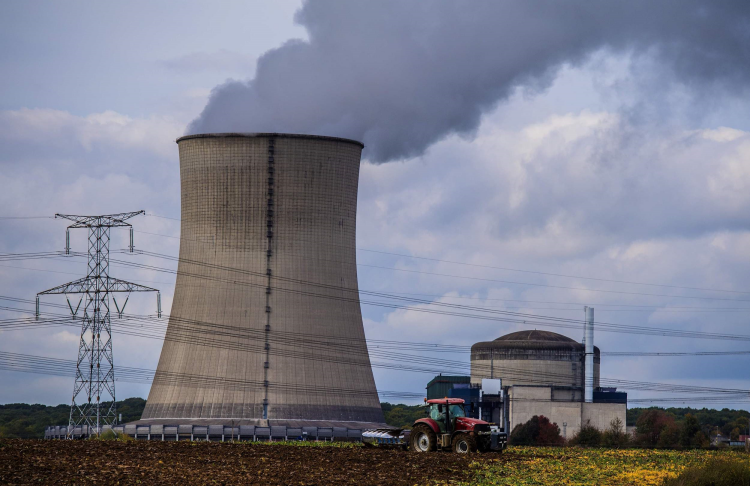In recent months, European countries have been grappling with ongoing disagreements over nuclear energy. In a bid to support nuclear power, France recently hosted a meeting of the "European Nuclear Alliance," where representatives from 16 European countries called on the European Union to consider the contributions of nuclear energy. They emphasized that nuclear power, as a complement to renewable energy, plays a significant role in achieving Europe's decarbonization goals. Meanwhile, Germany, which has been opposed to expanding nuclear power, recently brought an end to its nuclear era by shutting down its last three nuclear power plants in mid-April. With member states continuing to debate the role of nuclear energy in clean energy targets, a crucial vote on the European Union's renewable energy goals has been postponed. Experts believe that Europe's energy transition path is bound to face challenges due to the unbridgeable gap in nuclear energy development.

Drafting a Development "Roadmap"
According to a press release from the French Ministry of Energy Transition, the "European Nuclear Alliance" meeting focused on two main issues: establishing an independent European nuclear supply chain and the conditions for the revival of the European nuclear industry. The participating parties signed a joint statement, urging the formulation of a European action plan to promote cooperation in technology, innovation, and safety standards within the nuclear energy sector.
The "European Nuclear Alliance" meeting aims to chart a development "roadmap" for nuclear energy in Europe. The press release projects that, based on the continued safe operation of existing nuclear power facilities, if the European Union were to build 30 to 45 large-scale nuclear reactors while developing small modular reactors, the EU's nuclear power capacity would increase from the current 100 gigawatts to 150 gigawatts by 2050.
On June 19, the "European Nuclear Alliance" will hold another meeting to create a detailed roadmap for nuclear energy development. The European Commission has requested the alliance to draft a joint document outlining the nature of the projects.
"The 'European Nuclear Alliance' meeting clearly highlights the crucial role of nuclear power in driving Europe's energy transition process, promoting the development of the European nuclear supply chain and industry, and ensuring the independence and security of Europe's future energy supply," said Yang Chengyu, Deputy Researcher at the European Research Institute of the Chinese Academy of Social Sciences, in an interview with our reporter. He added that the "European Nuclear Alliance," initiated by France, aims to unite European countries that wish to develop nuclear energy and accelerate Europe's energy transition. The alliance includes France, Belgium, Bulgaria, Croatia, the Czech Republic, Finland, Hungary, the Netherlands, Poland, Romania, Slovenia, Slovakia, Estonia, Sweden, as well as Italy and the United Kingdom as observers. With the inclusion of Italy and the United Kingdom as observer countries, the participation has expanded to 16 countries, indicating the proactive willingness of European countries to develop nuclear power. The joint declaration signed after the meeting demonstrates consensus among the participating countries in strengthening cooperation in areas such as talent development, innovation, safety standards, and waste management.
Nuclear power is one of the low-carbon energy sources. According to data published by the Intergovernmental Panel on Climate Change, greenhouse gas emissions from nuclear power are comparable to onshore wind power, half that of hydroelectric power, and 1/4 to 1/3 that of photovoltaic power. This sets it significantly lower than coal-fired power, natural gas power, and biomass power.
"Unlike the fossil fuels from which Europe is trying to 'decouple,' nuclear power is a low-carbon energy source that provides stable, reliable, and controllable electricity," Yang Chengyu pointed out.

Challenges and Debates
While the "European Nuclear Alliance" aims to promote the development of nuclear energy in Europe, there are still significant challenges and debates to overcome. Germany's withdrawal from nuclear energy and its emphasis on renewable energy has set a precedent in Europe, with other countries closely observing the German experience.
Germany's exit from nuclear energy has been driven by concerns about safety and public opposition, particularly following the Fukushima nuclear disaster in 2011. Despite its withdrawal, Germany has successfully expanded renewable energy, particularly wind and solar power, in recent years. The country's transition to a low-carbon economy has become a benchmark for other European nations.
However, proponents of nuclear energy argue that it is a reliable and consistent source of low-carbon power that can provide baseload electricity, which is essential for meeting the energy demands of modern societies. They believe that nuclear energy, in conjunction with renewable sources, can help ensure a stable and resilient energy system.
The debate on nuclear energy's role in the energy transition is likely to continue as Europe grapples with its decarbonization goals. The postponed vote on the EU's renewable energy targets underscores the complexity and disagreements surrounding nuclear energy development in the region.
Europe's Energy Transition at a Crossroads
Europe's energy transition is at a critical juncture, with the path forward hinging on reconciling the divergent views on nuclear energy. The outcome of these debates will shape the region's future energy mix and its ability to achieve its decarbonization objectives.
As the "European Nuclear Alliance" convenes further meetings and works towards a detailed roadmap for nuclear energy development, the discussions and negotiations will likely intensify. It remains to be seen whether a consensus can be reached among European countries on the role of nuclear energy in the energy transition, or if the disagreements will continue to hinder progress in achieving a sustainable and low-carbon future.
